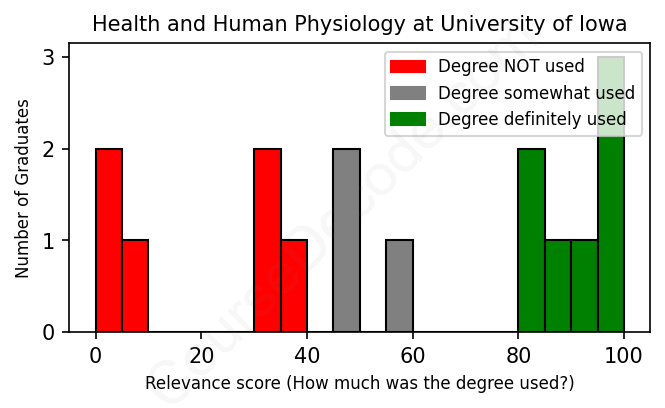
First, some facts. Of the Health and Human Physiology graduates from University of Iowa we've analyzed , here's how many have used (or NOT used) their degree in their career:

These are estimates based on AI analysis of 16 LinkedIn profiles (see below).
The verdict? Significantly below average. Overall, with an average relevance score of 56%, Health and Human Physiology graduates from University of Iowa have a much lower likelihood (-11%) of finding work in this field compared to the average graduate across all fields:
And for comparison, here's the chart for all profiles we've looked at across all degrees.
Also, after graduating, 43% of these graduates have pursued further education other than another Bachelor's degree (such as a Masters degree or other), compared to the average across all profiles of 35%. This suggests you may need more than just a Bachelors degree to be competitive as a Health and Human Physiology graduate.
See the details:
|
Relevance score: 100% We think this person has gone into a career highly relevant to their degree. We think this person has gone into a career highly relevant to their degree.
DEGREE INFOGraduated in 2019 from University of Iowa with a Bachelors in Health and Human Physiology. No other secondary education since. JOB HISTORY SINCE GRADUATIONRehabilitation Technician Rock Valley Physical Therapy Jan 2019 - Present ABOUTNo information provided. |
The top 10 most common jobs done by the graduates we've analyzed (ranked most common to least) are:
Looking through the jobs that grads from the University of Iowa with a degree in Health and Human Physiology have landed, it seems like the most common paths tend to fall into healthcare-related roles. Many graduates have gone on to work as nurses—like Neonatal ICU Nurses or Pediatric Nurse Practitioners—where they put their understanding of human physiology to practical use by caring for patients. Other popular options include jobs like Dental Hygienists and various research positions, which often require a strong grasp of health principles and human anatomy. So, overall, it seems that a good chunk of these positions are pretty relevant to what they studied.
However, not all paths taken by these graduates are directly linked to their degree. Some have found themselves in roles like customer service, administration, or even tech jobs that don't leverage their knowledge of health and human physiology at all. Tasks like being a Wordpress Developer or a Sales Associate may totally miss the mark when it comes to applying what they learned in college. Still, the trend shows that most of these grads do find a way to connect their job roles back to their education in health sciences, especially in positions that involve patient care or health education, making for a pretty supportive bridge from their studies to the workplace.
Here is a visual representation of the most common words in job titles for Health and Human Physiology graduates (this is across all Health and Human Physiology graduates we've analyzed, not just those who went to University of Iowa):

So, looking at the career paths of graduates from the Health and Human Physiology program at the University of Iowa, it seems like a pretty mixed bag. Right after graduation, many folks land jobs in healthcare settings like nursing, research assistant positions, or roles as dental hygienists. For example, a few graduates quickly moved into nursing roles or became dental hygiene instructors, indicating that the program does a solid job preparing students for immediate healthcare careers. It’s clear that those interested in clinical roles tend to follow these paths pretty effectively within their first few years, which is a good sign for anyone considering this degree.
Fast forward five to ten years later, and you see a variety of outcomes. Some graduates stick closely to their roots in healthcare, advancing to more specialized positions like Nurse Practitioners or managing roles within healthcare systems. Others have veered off and found themselves in unrelated fields, such as web development or customer service roles, which shows that while the degree has its strengths, it's not a guaranteed ticket into a specific career path. Overall, it's honest to say that many have found successful paths related to health and physiology, while a good chunk have taken more circuitous routes, which might not directly tie back to their undergraduate studies. This suggests that the degree offers flexibility, but it might not always lead to expected health-focused careers for everyone.
Getting a Bachelor's degree in Health and Human Physiology at the University of Iowa is pretty challenging, but it's not the hardest degree out there. You’ll be diving into anatomy, physiology, and a bunch of other sciences, which can be tough if you're not super into that stuff. The workload can be heavy with labs, projects, and exams, but if you're organized and willing to put in the effort, it’s definitely manageable. Plus, there are plenty of resources like tutoring and study groups to help you out. If you stay on top of your studies and really engage with the material, you might find it more rewarding than overwhelming!
Most commonly, in the LinkedIn profiles we've looked at, it takes people 4 years to finish a Bachelor degree in Health and Human Physiology.
From what it looks like, the health and human physiology grads from the University of Iowa seem to be doing pretty well, especially the ones who landed in healthcare roles. Nurses, for example, typically earn decent salaries, especially as they gain experience and move into advanced positions like Nurse Practitioner, which can really boost their earnings. The dental hygiene grads also appear to be on solid financial ground, with long-term roles in both clinical and teaching positions. Although some folks started in lower-paying roles, like administrative positions or entry-level jobs, many of them have transitioned to more lucrative positions over time. Overall, it seems like a lot of them have built promising careers where they can make good money—especially if they stick with it and keep climbing!
Here is a visual representation of the most common words seen in the "about" section of LinkedIn profiles who have a Bachelor degree in Health and Human Physiology (this is across all Health and Human Physiology graduates we've analyzed, not just those who went to University of Iowa). This may or may not be useful:

Here are all colleges offering a Bachelor degree in Health and Human Physiology (ordered by the average relevance score of their Health and Human Physiology graduates, best to worst) where we have analyzed at least 10 of their graduates:
| College | Score | Count |
|---|---|---|
 University of Iowa University of Iowa
|
56 | 16 |